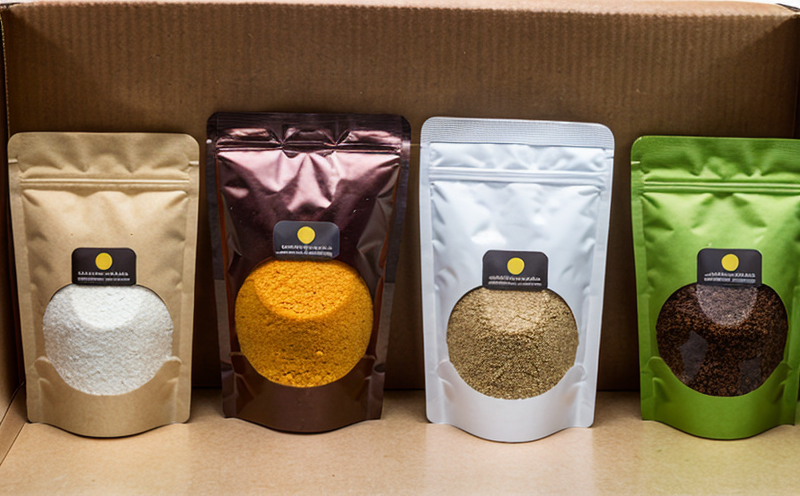Biodegradability Testing of Food Contact Plastics
In today’s rapidly evolving consumer products and product safety landscape, ensuring food contact materials (FCMs) are biodegradable is not only a regulatory requirement but also a critical step towards sustainable development. Biodegradability testing plays a pivotal role in evaluating the environmental impact of FCMs used in packaging and containers that come into direct contact with food.
The process involves assessing whether these materials can break down under specific conditions, typically through microbial activity or other natural processes, without leaving harmful residues behind. This is particularly important given the growing concern over microplastics and their potential impact on human health and the environment.
Our laboratory utilizes advanced testing methodologies compliant with international standards such as ISO 17589:2007 for determining biodegradability in composting conditions, ASTM D6400-13 for biodegradable plastics, and EN 13432 for compostable plastics. These tests are designed to simulate real-world scenarios where these materials might be exposed to specific environmental factors.
For instance, during our testing process, we subject FCM samples to controlled temperature and humidity conditions that mimic industrial composting environments. This allows us to evaluate the degradation rate over time and ensure compliance with regulatory standards. Additionally, we conduct residue analysis using Fourier Transform Infrared Spectroscopy (FTIR) to detect any potential harmful byproducts.
The testing process involves meticulous sample preparation and handling. Specimens are cut into standard sizes and shapes, ensuring uniformity across the batch. Once prepared, they undergo initial characterization using scanning electron microscopy (SEM) to identify surface features and chemical composition. This step is crucial for understanding how the material might interact with food products.
The actual biodegradability tests follow a structured protocol, which includes incubation periods under specific conditions followed by regular assessments of mass loss and carbon dioxide production. These metrics provide valuable insights into the biodegradation rate and efficiency of the FCMs. After testing, we analyze the data comprehensively to determine if the material meets the criteria for biodegradability.
The results are meticulously documented and reported in a clear and concise manner, ensuring stakeholders have a comprehensive understanding of the biodegradability properties of the tested materials. Compliance with regulatory requirements is paramount, and we ensure our clients receive detailed reports that outline any discrepancies from standard expectations.
Understanding the lifecycle impact of FCMs is essential for sustainable product design and development. By integrating biodegradability testing into their R&D processes, manufacturers can make informed decisions about material selection and formulation. This not only enhances product safety but also contributes to a more environmentally friendly supply chain.
Eurolab Advantages
At Eurolab, we pride ourselves on offering comprehensive and reliable testing services that go beyond mere compliance. Our expertise in biodegradability testing of food contact plastics is supported by state-of-the-art facilities and a team of experienced scientists who stay updated with the latest advancements in environmental science.
We offer several advantages that set us apart from our competitors:
- Comprehensive Testing Capabilities: We provide a full range of biodegradability tests tailored to meet the specific needs of various industries, ensuring that our clients receive accurate and reliable results.
- Accurate Reporting: Our detailed reports are backed by rigorous data analysis, providing clients with actionable insights into their product’s performance.
- Compliance Expertise: With a deep understanding of international standards such as ISO 17589:2007 and ASTM D6400-13, we ensure that all tests align with regulatory requirements.
- Custom Solutions: We offer tailored testing solutions to meet the unique challenges faced by different sectors within consumer products and safety testing.
- Expertise in R&D Support: Our team provides valuable input during the product development phase, helping clients design FCMs that are both safe and sustainable.
Why Choose This Test
Choosing biodegradability testing for food contact plastics is essential for several reasons:
- Regulatory Compliance: Many regions, including the European Union and North America, have strict regulations regarding biodegradable materials used in packaging. Ensuring compliance with these standards can help avoid costly fines and legal issues.
- Eco-Friendly Reputation: Demonstrating that your products are environmentally friendly can significantly enhance your brand’s reputation among consumers who prioritize sustainability.
- Innovation Drive: Testing biodegradability encourages innovation in material science, leading to the development of safer and more sustainable packaging solutions.
- Consumer Trust: Consumers are increasingly demanding eco-friendly products. By investing in biodegradability testing, companies can build trust and loyalty among their customer base.
- Risk Mitigation: Understanding the environmental impact of FCMs helps mitigate risks associated with potential harm from non-biodegradable residues.
- Circular Economy Contribution: Supporting a circular economy model by using biodegradable materials can contribute to long-term economic benefits and resource conservation.
Customer Impact and Satisfaction
Our clients benefit from our biodegradability testing services in numerous ways:
- Enhanced Product Safety: By ensuring that FCMs meet the highest safety standards, we help protect consumers and maintain trust.
- Sustainable Manufacturing Practices: Our testing supports sustainable manufacturing processes, helping companies reduce their environmental footprint.
- Achieving Regulatory Compliance: Compliance with international standards ensures that products can be sold globally without facing regulatory barriers.
- Innovation and Development: Our insights into biodegradability trends and technologies enable clients to stay ahead of the curve in product development.
- Customer Satisfaction: By offering reliable, accurate testing services, we contribute to higher customer satisfaction through safer and more sustainable products.





